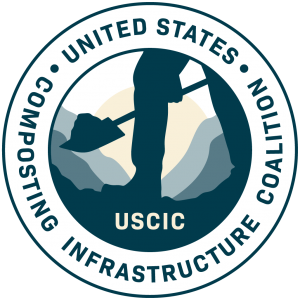5/5
Announcing the U.S. Composting Infrastructure Coalition

The Plant Based Products Council is proud to be a founding member of the U.S. Composting Infrastructure Coalition, bringing together stakeholders across the organics recycling and sustainable materials communities to help find solutions for waste reduction and recovery solutions like composting.
Increased investment in American composting infrastructure provides many important benefits to our environment and economy, and to communities nationwide. The U.S. Composting Infrastructure Coalition is dedicated to advocating for policies, legislation, and other measures to expand composting infrastructure and increase access to programs that divert food waste, yard trimmings, and certified compostable packaging. By diverting more food waste to composting facilities, states and localities can significantly reduce landfill volume, decrease greenhouse gas emissions, and create jobs and economic opportunity. Plant-based certified compostable packaging and food serviceware can help support diversion of even more food waste to composting.
Instead of becoming burdensome and costly in a landfill, food waste plus plant-based certified compostable materials can together be turned into compost. Because compost is rich in organic matter and nutrients, it benefits soil health and the environment through improving soil structure, increasing soil water holding capacity, and carbon sequestration capabilities.
Developing our country’s composting infrastructure will bring economic development and job creation to local communities. Further, composting facilities are more efficient job creators than incinerators or landfill operations.
While the benefits of composting are clear, the start-up costs to establish a new facility, or expand an existing one, can be a barrier to entry. The creation of the U.S. Composting Infrastructure Coalition is an important step forward in demonstrating the strong, wide-ranging support for this responsible waste management solution.
Read the U.S. Composting Infrastructure Coalition’s press release below.
FOR IMMEDIATE RELEASE
May 5, 2021
Contact:
Frank Franciosi
uscompostinginfrastructure@gmail.com
NEW COALITION ADVOCATES FOR INVESTMENT AND EXPANSION OF AMERICA’S COMPOSTING INFRASTRUCTURE
The U.S. Composting Infrastructure Coalition brings together a cross-section of industry leaders to promote increased investment in composting infrastructure
Washington, D.C. – Today, stakeholders from the organics recycling and sustainable materials communities launched the U.S. Composting Infrastructure Coalition to support innovative and responsible waste reduction and recovery solutions like composting. The Coalition believes composting serves as an opportunity to address key environmental challenges and deliver positive economic impacts to people and communities.
The Coalition advocates for policies, legislation, and other measures to expand composting programs and increase access to robust programs that divert food waste, yard trimmings, and certified compostable packaging. Founding Coalition Members and Advisors include:
Members: U.S. Composting Council, Plant Based Products Council, Institute for Local Self Reliance, Biodegradable Products Institute, Foodservice Packaging Institute, National Waste & Recycling Association, Corn Refiners Association
Advisors: Natural Resources Defense Council, Closed Loop Partners, ReFED, American Public Works Association, U.S. Green Building Council TRUE, GreenBlue Sustainable Packaging Coalition
“There is an immediate, significant need for robust investment into composting infrastructure,” said Frank Franciosi, U.S. Composting Infrastructure Coalition spokesperson. “Investing in composting infrastructure will bring a number of environmental and economic benefits to local communities and to our nation as a whole. The U.S. Composting Infrastructure Coalition looks forward to finding more innovative and responsible ways to address organic waste concerns.”
Investment in composting infrastructure will benefit the economy, the environment, and rural and urban communities. Increased access to composting serves as a cost-saving measure to divert food scraps and other organic materials away from landfilling and incineration, which predominantly impact low-income communities and especially communities of color.
Composting also helps address our climate crisis by diverting organic matter from landfills, where it creates significant methane emissions. Compost benefits soil health and green infrastructure through improving water retention, among other benefits. Community scale composting helps foster neighborhood green spaces and supports local jobs and local, healthy food production.
Learn more about the U.S. Composting Infrastructure Coalition at https://compostinfrastructure.com/ or write to us at uscompostinginfrastructure@gmail.com.
###
